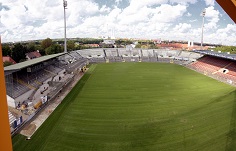
Word of the Day: Facile
Paul Schleifer
Facile is primarily an adjective, but it has a variety of meanings, in part depending upon the type of noun that it is modifying. The OED lists its first appearance as coming in 1484, in a translation of Aesop’s fables by William Caxton, the first English person to use the moveable type printer invented by Gutenberg: “It is facyle to scape out of the handes of the blynd.” Here it means “easy to do.” It can also mean “easy to understand” when used about instructions or directions. The word takes on a disparaging connotation when used about ideas or doctrines or teachings: “We must not suffer ourselves to be too easily led off into a Tariff crusade through the facile explanation which some economists profess to have found of our commercial stagnation (N.Y. Times 17 Oct. 4/3).”
About people, facile can mean “Easily led or influenced” or even “Weak-minded, gullible” (OED). But it can also mean “gentle, lenient, mild,” as in Fuller’s description of Queen Elizabeth I in his The Church History of Britain as “A Princesse most facil to forgive injuries.” In centuries past it was also used as an adverb, but such a usage is now obsolete.
According to www.etymonline.com, the word comes into English in the “late 15c., ‘easy to do,’ from Middle French facile ‘easy,’ from Latin facilis ‘easy to do,’ of persons, ‘pliant, courteous, yielding,’ from facere ‘to do’ (from PIE root *dhe- ‘to set, put’). Usually now with depreciatory implication. Of persons, ‘easily led,’ from 1510s.”
On this date in 1860, the football club now known as TSV 1860 Munich was formed. Actually, the origin of the club dates back to 1848, when a group of men meeting in a pub decided to form an athletic club, but the club was banned in 1849 by the Bavarian king for “republican activities”—remember that 1848 and 1849 were years of dramatic revolt throughout Europe (you can learn all about the revolutions of 1848 by listening to Mike Duncan’s Revolutions Podcast [http://www.revolutionspodcast.com/], episode 7). In 1899, the club formed a football department, and it began playing games three years later (https://en.wikipedia.org/wiki/TSV_1860_Munich#Origins_of_the_club).
TSV 1860 Munich had a fair amount of success throughout the 20th century. Up until 1963, Germany had regional, semi-professional leagues, and 1860 Munich was part of one of those. But in the years after World War II, as other nations began to create centralized professional leagues, the best German players went overseas to play. That created a desire among football fans to create a centralized league in Germany, and in 1863, the Bundesliga was formed. Fortunately for 1860 Munich, the side had won the Oberliga Süd, which was the southernmost of the five regional leagues forming the top level of football in West Germany from 1945 until the formation of the Bundesliga. That made 1860 Munich eligible to become one of the founding members of the Bundesliga.
People familiar with football, and German football in particular, are likely to be most familiar with the name Bayern Munich (formed in 1900), and it is true that Bayern Munich has won more Bundesliga championships than any other team—in fact, Bayern has won almost half of the championships in the league’s 55-year history. 1860 Munich has won the Bundesliga only once, in the 1965-66 season, which also happened to be the first year that Bayern played in the Bundesliga.
From that 1966 Bundesliga championship, things have gone downhill for 1860 Munich. After the 2016-17 season, the club was relegated to the Regionalliga Bayern, the fourth tier of German professional football. But things may be looking up as the club won the Bavarian regional league this year, giving it a chance to move up to 3. Bundesliga, the third tier, if they can win a spot through the playoffs with the other regional champions.
But there is nothing facile about moving up to the Bundesliga. On this day of the founding of TSV 1860 Munich, I wish the club luck.
The image is a photo of Grunwalder Stadion in Munich, Germany, taken by Michael Lucan, 20 September 2012. Built in 1911 and for many years the home of 1860 Munich, it is once again the home because of 1860’s relegation to the Regionalliga Bayern. It was also the site of the filming of the Monty Python sketch The Philosopher’s Football Match.